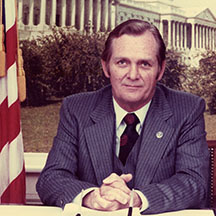The First Amendment to the Bill of Rights states:
Congress shall make no law respecting an establishment of religion, or prohibiting the free exercise thereof; or abridging the freedom of speech, or of the press; or the right of the people peaceably to assemble, and to petition the Government for a redress of grievances
Plainly, the amendment guarantees three things for American citizens: freedom of/from religion, freedom of speech and press, and the right to assemble and protest the government.

In the 1960s, the Supreme Court ruled that prayer in public schools violated the first amendment and thus was unconstitutional. Many Americans were angered by this decision and petitioned their Congressmen to vote on bills that would bring prayer back to public schools. In 1979, Congressman Marvin Leath (the Democratic representative of Texas’s 11th district) was inundated with requests to overrule the Supreme Court’s decision.



As these documents show, Leath personally supported prayer in schools and promised to support any legislation that did the same. The 1971 Lemon v. Kurtzman ruling established that any practice in a state-sponsored school must have a secular purpose, neither advance nor inhibit religion, and must not result in an excessive entanglement of government and religion. Many proponents of school prayer still argue that removing the free exercise of prayer from public schools actually violates the second criteria by inhibiting religion. Opponents, however, argue that prayer has no secular purpose and inevitably advances one religion over another.